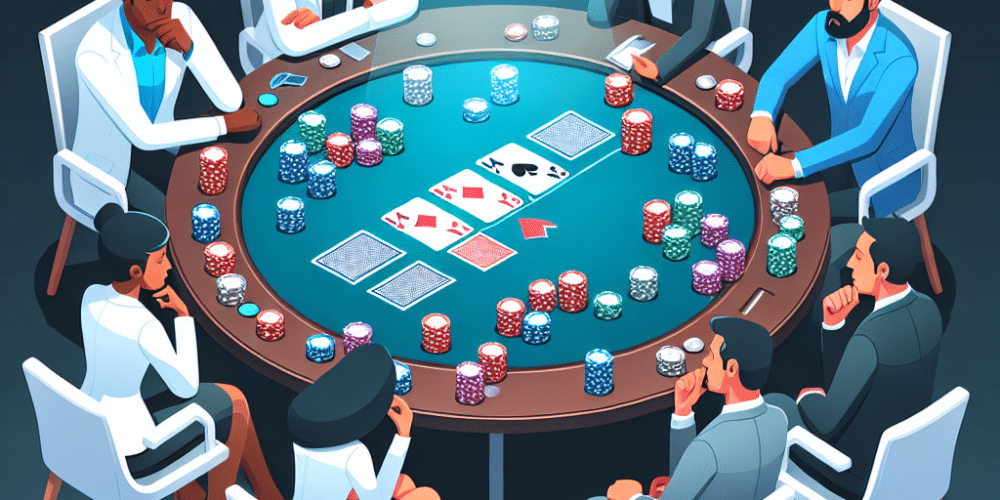In August, Marc Goone, a seasoned cash game player and founder of Hungry Horse Poker, dedicated 100 hours to analyzing Alan Keating’s poker strategies. The meticulous study of Keating’s performance led the Hustler Casino Live commentator to express admiration for Keating’s skills in cash games, highlighting his sharp strategic acumen.
As the poker world buzzed with Goone’s insights, attention shifted to another poker giant: Phil Hellmuth, often dubbed the “Poker Brat.” Known for his dramatic flair and emotional outbursts at the table, Hellmuth’s style has long been a topic of debate among poker enthusiasts. Goone, after his deep dive into Keating’s play, turned his analytical gaze towards Hellmuth and shared some critical observations.
“Phil Hellmuth plays a style that’s almost risk-averse,” Goone suggested, noting that while Hellmuth has an impressive record with 16 World Series of Poker (WSOP) bracelets, his approach might not be as adaptable to the evolving landscape of modern poker, which increasingly favors aggressive, data-driven strategies. Goone’s critique centered on Hellmuth’s tendency to rely on his historical success and instincts, which some argue may not be sufficient in the face of new analytical techniques employed by younger players.
Hellmuth’s reputation is built on his instinctive reading of opponents and ability to induce mistakes, a method that has served him well over decades. However, the industry is witnessing a shift where analytical rigor and game theory optimal (GTO) play are becoming essential. “He’s a legend. There’s no denying his achievements, but the game has changed,” Goone reflected, pointing to the influx of players who leverage technology and statistics to gain an edge.
This sentiment echoes a broader debate within the poker community about the balance between traditional instinctive play and modern analytical methods. Some argue that Hellmuth’s experience and ability to read opponents is a timeless asset, while others believe that without adapting to new strategies, even the most skilled players can struggle against today’s competition.
Statistics from recent major tournaments paint a clear picture of this evolution. Younger poker professionals, many of whom have backgrounds in mathematics and computer science, are making significant inroads, often outperforming seasoned veterans. The WSOP circuit, a barometer for cutting-edge play, has showcased numerous instances where data-driven strategies trump traditional methods.
Despite these challenges, Hellmuth remains a formidable force in poker. His confidence and psychological tactics often unsettle opponents. “He knows how to get under people’s skin,” some players remarked, noting that this psychological warfare often leads to errors from less experienced players. Hellmuth’s charisma and showmanship are integral to his brand, something that resonates well with poker audiences and sponsors alike.
However, not everyone agrees with the critique of Hellmuth’s style. Many in the poker community argue that his instinct and experience are irreplaceable assets. They assert that poker remains an art as much as a science, and undervaluing the psychological aspect is a mistake. For every statistician claiming the upper hand, there’s a counterpoint emphasizing the unpredictable human element that no algorithm can fully capture.
Furthermore, Hellmuth’s fan base continues to support him passionately. They point to his track record and argue that his methods, while unconventional and sometimes brash, have consistently led to victory. “Results speak for themselves,” they argue, citing his continued presence in high-stakes games and television appearances as evidence of his enduring relevance.
As poker continues to evolve, players like Hellmuth will inevitably face pressure to adapt. The rise of online poker platforms and the integration of AI and machine learning into game analysis have transformed how strategies are developed and executed. This shift challenges traditionalists to incorporate new tools without losing the essence of their play. “It’s about balance,” some suggest, proposing that the melding of instinct and analysis might be the future direction for poker.
In conclusion, the debate around Phil Hellmuth’s poker style is emblematic of broader conversations happening across the gaming industry. As the poker world stands at a crossroads, the tension between old-school charisma and new-age analytics reflects a dynamic and rapidly changing landscape. Whether Hellmuth will choose to adjust his play remains to be seen, but his legacy as a poker icon is secure, regardless of future outcomes. The ongoing discussion serves as a reminder of poker’s complexity and the diverse approaches players can take to achieve success.

David Garato is a luminary in gaming journalism, renowned for peeling back the curtain on the gaming world with his witty and insightful commentary. A decade into weaving stories from the pixelated edges of indie games to the expansive universes of AAA titles, David’s work is a thrilling blend of analysis and adventure. When not writing, he’s live-streaming, sharing his gaming exploits with an engaged and growing audience. David doesn’t just write about games; he lives them, making him a trusted guide in the gaming community.
















